Nuevo | |
|---|---|
Barrio | |
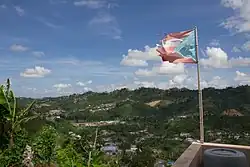 View from Barrio Nuevo | |
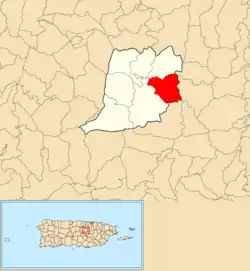 Location of Nuevo within the municipality of Naranjito shown in red | |
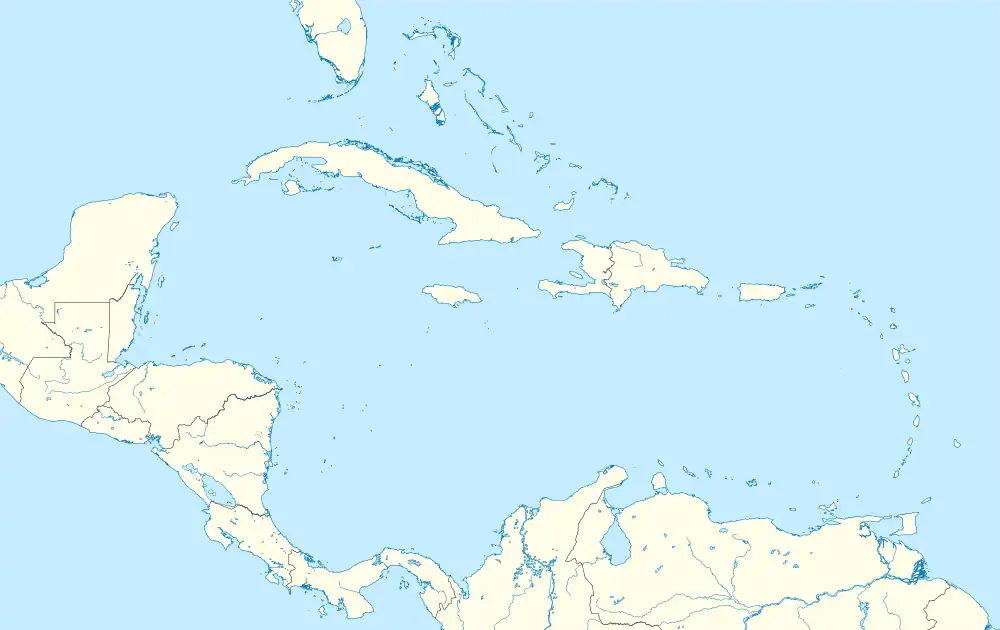 Nuevo Location of Puerto Rico | |
| Coordinates: 18°17′12″N 66°13′25″W / 18.286562°N 66.223521°W[1] | |
| Commonwealth | |
| Municipality | |
| Area | |
| • Total | 3.17 sq mi (8.2 km2) |
| • Land | 3.16 sq mi (8.2 km2) |
| • Water | 0.01 sq mi (0.03 km2) |
| Elevation | 981 ft (299 m) |
| Population (2010) | |
| • Total | 4,004 |
| • Density | 1,267.1/sq mi (489.2/km2) |
| Source: 2010 Census | |
| Time zone | UTC−4 (AST) |
| Zip code | 00719 |
Nuevo is a barrio in the municipality of Naranjito, Puerto Rico. Its population in 2010 was 4,004.[3][4][5]
History
Nuevo was in Spain's gazetteers[6] until Puerto Rico was ceded by Spain in the aftermath of the Spanish–American War under the terms of the Treaty of Paris of 1898 and became an unincorporated territory of the United States. In 1899, the United States Department of War conducted a census of Puerto Rico finding that the population of Nuevo barrio was 1,081.[7]
| Census | Pop. | Note | %± |
|---|---|---|---|
| 1900 | 1,081 | — | |
| 1910 | 1,415 | 30.9% | |
| 1920 | 1,495 | 5.7% | |
| 1930 | 1,589 | 6.3% | |
| 1940 | 1,801 | 13.3% | |
| 1950 | 2,014 | 11.8% | |
| 1960 | 2,154 | 7.0% | |
| 1970 | 2,528 | 17.4% | |
| 1980 | 3,186 | 26.0% | |
| 1990 | 3,715 | 16.6% | |
| 2000 | 3,840 | 3.4% | |
| 2010 | 4,004 | 4.3% | |
| U.S. Decennial Census 1899 (shown as 1900)[8] 1910-1930[9] 1930-1950[10] 1980-2000[11] 2010[12] | |||
Sectors
Barrios (which are, in contemporary times, roughly comparable to minor civil divisions)[13] in turn are further subdivided into smaller local populated place areas/units called sectores (sectors in English). The types of sectores may vary, from normally sector to urbanización to reparto to barriada to residencial, among others.[14][15][16]
The following sectors are in Nuevo barrio:[17][18]
Camino Don Manolo, Camino González Mathews, Camino Los Matos, Eusebio Rivera, Parcelas Hevia, Sector Aponte, Sector Bernard, Sector Bunker Hills, Sector Cabrera, Sector Cintrón, Sector Cuadrado, Sector Doña Bacha, Sector Entrada Guadiana, Sector Febus, Sector Hevia, Sector Hogar Crea, Sector La Tosca, Sector Loma del Viento, Sector Martínez, Sector Matadero, Sector Mulitas, Sector Negrón, Sector Ortega, Sector Puente Plata, Sector Santa María (antes Villa Embrolla), Sector Siete Curvas, Sector Sostre, Urbanización Campo Bello, Urbanización Valle Verde, and Villa del Plata.
Hurricane Maria
After Hurricane Maria struck the island of Puerto Rico, residents of Nuevo barrio waited 7 to 8 months to have electrical power restored.[19] Several landslides affected this barrio along PR-5. Work was completed with FEMA funds in October 2021 to stabilize and make the highway safe.[20]
Gallery
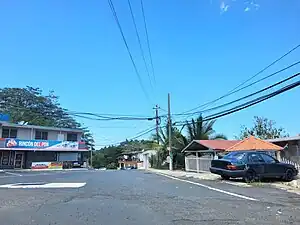 Puerto Rico Highway 8126 in Barrio Nuevo
Puerto Rico Highway 8126 in Barrio Nuevo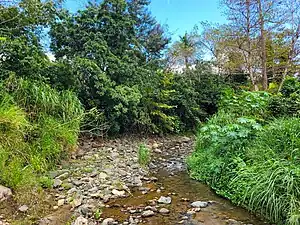 Quebrada Anones in Barrio Nuevo
Quebrada Anones in Barrio Nuevo
See also
References
- 1 2 "US Gazetteer 2019". US Census. US Government.
- ↑ U.S. Geological Survey Geographic Names Information System: Nuevo barrio
- ↑ Picó, Rafael; Buitrago de Santiago, Zayda; Berrios, Hector H. Nueva geografía de Puerto Rico: física, económica, y social, por Rafael Picó. Con la colaboración de Zayda Buitrago de Santiago y Héctor H. Berrios. San Juan Editorial Universitaria, Universidad de Puerto Rico,1969.
- ↑ Gwillim Law (20 May 2015). Administrative Subdivisions of Countries: A Comprehensive World Reference, 1900 through 1998. McFarland. p. 300. ISBN 978-1-4766-0447-3. Retrieved 25 December 2018.
- ↑ Puerto Rico: 2010 Population and Housing Unit Counts.pdf (PDF). U.S. Dept. of Commerce, Economics and Statistics Administration, U.S. Census Bureau. 2010.
- ↑ "Anuario del comercio, de la industria, de la magistratura y de la administración. 1881". Biblioteca Nacional de España (in Spanish). p. 1614. Retrieved 4 April 2023.
- ↑ Joseph Prentiss Sanger; Henry Gannett; Walter Francis Willcox (1900). Informe sobre el censo de Puerto Rico, 1899, United States. War Dept. Porto Rico Census Office (in Spanish). Imprenta del gobierno. p. 162.
- ↑ "Report of the Census of Porto Rico 1899". War Department Office Director Census of Porto Rico. Archived from the original on July 16, 2017. Retrieved September 21, 2017.
- ↑ "Table 3-Population of Municipalities: 1930 1920 and 1910" (PDF). United States Census Bureau. Archived (PDF) from the original on August 17, 2017. Retrieved September 21, 2017.
- ↑ "Table 4-Area and Population of Municipalities Urban and Rural: 1930 to 1950" (PDF). United States Census Bureau. Archived (PDF) from the original on August 30, 2015. Retrieved September 21, 2014.
- ↑ "Table 2 Population and Housing Units: 1960 to 2000" (PDF). United States Census Bureau. Archived (PDF) from the original on July 24, 2017. Retrieved September 21, 2017.
- ↑ Puerto Rico: 2010 Population and Housing Unit Counts.pdf (PDF). U.S. Dept. of Commerce Economics and Statistics Administration U.S. Census Bureau. 2010. Archived (PDF) from the original on 2017-02-20. Retrieved 2019-08-02.
- ↑ "US Census Barrio-Pueblo definition". factfinder.com. US Census. Archived from the original on 13 May 2017. Retrieved 5 January 2019.
- ↑ "Agencia: Oficina del Coordinador General para el Financiamiento Socioeconómico y la Autogestión (Proposed 2016 Budget)". Puerto Rico Budgets (in Spanish). Retrieved 28 June 2019.
- ↑ Rivera Quintero, Marcia (2014), El vuelo de la esperanza: Proyecto de las Comunidades Especiales Puerto Rico, 1997-2004 (first ed.), San Juan, Puerto Rico Fundación Sila M. Calderón, ISBN 978-0-9820806-1-0
- ↑ "Leyes del 2001". Lex Juris Puerto Rico (in Spanish). Retrieved 24 June 2020.
- ↑ "Plan Territorial (2012)" (PDF). JP PR Gov (in Spanish). Gobierno Municipal de Naranjito -Oficina de Planificación y Ordenación Territorial. p. 43. Retrieved 26 June 2019.
- ↑ "PRECINTO ELECTORAL NARANJITO 073" (PDF). Comisión Estatal de Elecciones (in Spanish). PR Government. 26 September 2019. Archived (PDF) from the original on 22 July 2020. Retrieved 21 July 2020.
- ↑ "Eso es una fecha que no se me va a olvidar nunca". El Nuevo Día (in Spanish).
- ↑ "Proyectos de Recuperación: Naranjito, Puerto Rico". Facebook Watch (in Spanish). October 13, 2021. Retrieved October 15, 2021.